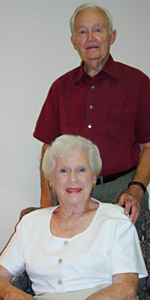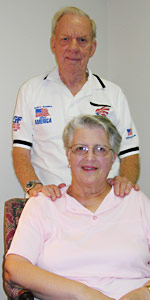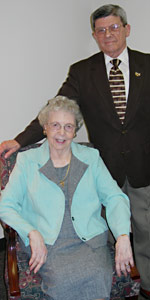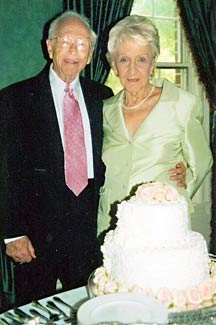Posted: 5/26/06
Long-married couples share the secret of success
By Ken Camp
Managing Editor
HOUSTON—It not only takes a village to raise a child; it also takes a village to make marriage successful, some long-married Baptist couples agreed.
|
| Bill and Ruth Osborne are among 139 couples Tallowood Baptist Church in Houston recently recognized as having been married 50 years or longer. (Photos by Ken Camp) |
“It’s important to be part of community,” Bill Osborne said, pointing to examples from 60 years of life together with his wife, Ruth, to illustrate the principle.
He met his future wife in a sociology class at Purdue University in 1945. He was a Baptist farm boy from Kansas; she grew up in Indiana, the daughter of strict Roman Catholic parents.
“He was taught that everyone who was Catholic was a heathen, and I was taught that everyone who wasn’t Catholic was a heathen,” she recalled.
Once they started dating, they learned to respect each other’s commitments to God.
“I grew up believing only priests and nuns could interpret the Bible. I was impressed by the way he could quote Scripture and how he could explain it,” she said.
As their relationship grew more serious and they discussed marriage, they committed to find a church where they could worship together. After exploring the beliefs of several denominations, they finally agreed Baptists seemed closest to their understanding of New Testament teachings.
When they decided to marry at a Baptist church in West Lafayette, Ind., Osborne’s parents were several hundred miles away and unable to help with the wedding. Her parents—who disapproved of her marriage to a Protestant—refused to participate in any way.
“So, the church gave us a wedding. In the 60 years since then, I’ve never known of another congregation to do that for a young couple, but they provided everything for us,” Osborne said. Church members even gave the young couple a reception—once they were able to round up enough rationed sugar for a wedding cake.
“When we needed them, the community responded to us. … And community is a two-way street. It’s important for a couple to find a place where they can work together—to contribute and share the experience of doing something meaningful.”
Since they moved to Houston in 1968, the Osbornes—parents of four children—found community at Tallowood Baptist Church. And they’re not alone. Recently, the church honored 139 couples from their membership who have been married 50 years or longer.
 |
 |
| Roger and Lavonia Duck |
Hudson and Claire Mann |
“To say that, it sounds as if our church is made up entirely of senior adults, but the wonderful thing about our congregation is how intergenerational it is,” said Pastor Duane Brooks. “The young people look up to these couples, and they encourage each other.”
One long-married couple at Tallowood—B.O. and Marilyn Wilkins—met as students at Louisiana State University. She was society editor of the campus paper; he came to the newspaper office to submit brief items for an engineering student organization. They struck up a conversation and agreed to go on a date.
“And we didn’t like each other a bit,” she recalled. “At a Tiger football game, I was interested in hats and high heels, but he was interested in football.”
But several years later, after Wilkins completed his military service in World War II, graduated from college and began work in Port Arthur, some high school classmates from northeast Arkansas contacted him.
They were scheduled to travel through Baton Rouge and wanted to get together with him. He called his mother there and asked her to see whether Marilyn Kirby might be available to be his guest that evening.
She agreed, and it marked the first of many shared experiences for the young couple. After a four-month engagement, they married.
And 56 years later, they still begin each day with a kiss and the words: “I love you,” he noted.
Their love for each other—sustained in the context of a supportive community at Tallowood Baptist, where they have been members since 1965—helped them withstand heartache, particularly the death of one of their two children—22-year-old son Stephen—in 1973.
 |
 |
| Roy and Audrey Stolting |
B.O. and Marilyn Wilkins |
“For all those years, we sang in the choir and stood by each other,” both literally and figuratively, she said. “We learned to keep on keeping on. Even after the death of our son, we were singing in the choir. Later, people told us what an encouragement it was to see us there.”
Another Tallowood Baptist couple, Hudson and Claire Mann, met on the tennis courts in their hometown of Homer, La. She was in the seventh grade, and he was a sophomore. They dated in high school but drifted apart as he went to LSU, and she attended Baylor University.
But he never forgot her, and an aunt encouraged him to write her at Baylor to let her know he still cared. She received the same urging to write him, and their letters crossed in the mail. After a fairly brief courtship, they married in 1947.
“Long before we got married, her faith in God was a great attraction to me, even more than her ability on the tennis court or her physical beauty—which was considerable. … I had prayed the Lord would bring her back into my life. So when he did, I felt obligated to marry her,” he said, with a twinkle in his eye, when asked for the secret to their long marriage.
“A good sense of humor helps out a lot, too,” she added.
That sense of humor served them well as they discovered early in their marriage they were two very different people who grew up in distinctly different families.
“We had to learn to adjust from the word go, and there have been adjustments all along the way,” he said.
Lavonia Duck learned early in her marriage the importance of making adjustments—even unwelcome ones. She met her future husband, Roger, during a morning devotional time on the Hardin-Simmons University campus. She fell in love with the young business major, and after they dated about a year and a half, they married.
To her dismay, during his senior year, he felt God’s calling into ministry.
“I grew up in the Depression, and my father was the pastor of half-time churches that paid him in chickens and produce,” she recalled.
“I loved the church. I had played the piano in church since I was 8 or 9 years old. I was the first queen regent in GAs in Texas. But I just didn’t see myself in the role of a pastor’s wife. I wanted more stability than what I had seen growing up.”
But she adjusted, and for 56 years she has served alongside her husband in ministry—first in the pastorate, later as missionaries in Colombia and Southern Baptist Foreign Mission Board regional representatives, and finally in their shared practice as marriage and family therapists and licensed professional counselors.
“We have spent most of our married life working together or in close proximity, and we seldom get tired of each other,” he said.
But it hasn’t always been easy. Since they married young, they faced a big challenge learning how to grow up as individuals and learn to respect their differences, Duck said.
“We are certainly not compatible in many ways. Actually, we go about almost everything we do differently,” he said. But in time, they learned to “define those differences and celebrate them.”
Roy and Audrey Stolting—who have been Tallowood Baptist members 13 years—first met when she was 13 years old, and he was a 20-year-old young man about to enlist in the military.
When he returned from active duty three years later, “she had changed considerably,” he recalled—and he liked the changes.
Initially, she agreed to date him just to make another boy jealous. But he impressed her, and “even met with my parents’ approval, which wasn’t easy,” she said.
After a 13-month courtship, they married, and they have been together 58 years.
The couple learned early the importance of depending on God.
When he returned to active duty in the Air Force—at the promise of twice the salary he was making as a first-year schoolteacher in New Jersey—he was shipped off to Japan for more than three years. At the point when his wife was preparing to join him, the United States entered the Korean War, and the military denied all requests for dependent family travel overseas for two years.
“The Lord never took his hand off us,” she said. “He promised he would never leave us nor forsake us, and he never has.”
When asked what advice they would offer young couples, Stolting responded: “Be truthful. Be faithful. And discuss things before making a decision. Talk about it before you go out and do foolish things.”
News of religion, faith, missions, Bible study and Christian ministry among Texas Baptist churches, in the BGCT, the Southern Baptist Convention ( SBC ) and around the world.





